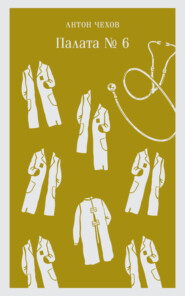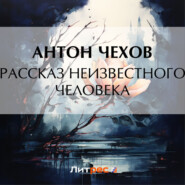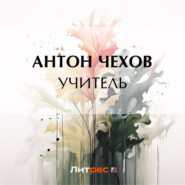По всем вопросам обращайтесь на: info@litportal.ru
(©) 2003-2024.
✖
The Bishop and Other Stories
Настройки чтения
Размер шрифта
Высота строк
Поля
"Something like a storm!" said an unfamiliar bass voice, and the stranger cleared his throat as though he had just tossed off a good glass of vodka.
Yegorushka opened his eyes. Close to the waggon stood Panteley, Emelyan, looking like a triangle, and the giants. The latter were by now much shorter, and when Yegorushka looked more closely at them they turned out to be ordinary peasants, carrying on their shoulders not pikes but pitchforks. In the space between Panteley and the triangular figure, gleamed the window of a low-pitched hut. So the waggons were halting in the village. Yegorushka flung off the mat, took his bundle and made haste to get off the waggon. Now when close to him there were people talking and a lighted window he no longer felt afraid, though the thunder was crashing as before and the whole sky was streaked with lightning.
"It was a good storm, all right,." Panteley was muttering. "Thank God… my feet are a little softened by the rain. It was all right… Have you got down, Yegory? Well, go into the hut; it is all right.."
"Holy, holy, holy!" wheezed Emelyan, "it must have struck something
… Are you of these parts?" he asked the giants.
"No, from Glinovo. We belong to Glinovo. We are working at the
Platers'."
"Threshing?"
"All sorts. Just now we are getting in the wheat. The lightning, the lightning! It is long since we have had such a storm.."
Yegorushka went into the hut. He was met by a lean hunchbacked old woman with a sharp chin. She stood holding a tallow candle in her hands, screwing up her eyes and heaving prolonged sighs.
"What a storm God has sent us!" she said. "And our lads are out for the night on the steppe; they'll have a bad time, poor dears! Take off your things, little sir, take off your things."
Shivering with cold and shrugging squeamishly, Yegorushka pulled off his drenched overcoat, then stretched out his arms and straddled his legs, and stood a long time without moving. The slightest movement caused an unpleasant sensation of cold and wetness. His sleeves and the back of his shirt were sopped, his trousers stuck to his legs, his head was dripping.
"What's the use of standing there, with your legs apart, little lad?" said the old woman. "Come, sit down."
Holding his legs wide apart, Yegorushka went up to the table and sat down on a bench near somebody's head. The head moved, puffed a stream of air through its nose, made a chewing sound and subsided. A mound covered with a sheepskin stretched from the head along the bench; it was a peasant woman asleep.
The old woman went out sighing, and came back with a big water melon and a little sweet melon.
"Have something to eat, my dear! I have nothing else to offer you,." she said, yawning. She rummaged in the table and took out a long sharp knife, very much like the one with which the brigands killed the merchants in the inn. "Have some, my dear!"
Yegorushka, shivering as though he were in a fever, ate a slice of sweet melon with black bread and then a slice of water melon, and that made him feel colder still.
"Our lads are out on the steppe for the night,." sighed the old woman while he was eating. "The terror of the Lord! I'd light the candle under the ikon, but I don't know where Stepanida has put it. Have some more, little sir, have some more.."
The old woman gave a yawn and, putting her right hand behind her, scratched her left shoulder.
"It must be two o'clock now," she said; "it will soon be time to get up. Our lads are out on the steppe for the night; they are all wet through for sure.."
"Granny," said Yegorushka. "I am sleepy."
"Lie down, my dear, lie down," the old woman sighed, yawning. "Lord Jesus Christ! I was asleep, when I heard a noise as though someone were knocking. I woke up and looked, and it was the storm God had sent us… I'd have lighted the candle, but I couldn't find it."
Talking to herself, she pulled some rags, probably her own bed, off the bench, took two sheepskins off a nail by the stove, and began laying them out for a bed for Yegorushka. "The storm doesn't grow less," she muttered. "If only nothing's struck in an unlucky hour. Our lads are out on the steppe for the night. Lie down and sleep, my dear… Christ be with you, my child… I won't take away the melon; maybe you'll have a bit when you get up."
The sighs and yawns of the old woman, the even breathing of the sleeping woman, the half-darkness of the hut, and the sound of the rain outside, made one sleepy. Yegorushka was shy of undressing before the old woman. He only took off his boots, lay down and covered himself with the sheepskin.
"Is the little lad lying down?" he heard Panteley whisper a little later.
"Yes," answered the old woman in a whisper. "The terror of the Lord!
It thunders and thunders, and there is no end to it."
"It will soon be over," wheezed Panteley, sitting down; "it's getting quieter… The lads have gone into the huts, and two have stayed with the horses. The lads have… They can't;.. the horses would be taken away… I'll sit here a bit and then go and take my turn… We can't leave them; they would be taken.."
Panteley and the old woman sat side by side at Yegorushka's feet, talking in hissing whispers and interspersing their speech with sighs and yawns. And Yegorushka could not get warm. The warm heavy sheepskin lay on him, but he was trembling all over; his arms and legs were twitching, and his whole inside was shivering… He undressed under the sheepskin, but that was no good. His shivering grew more and more acute.
Panteley went out to take his turn with the horses, and afterwards came back again, and still Yegorushka was shivering all over and could not get to sleep. Something weighed upon his head and chest and oppressed him, and he did not know what it was, whether it was the old people whispering, or the heavy smell of the sheepskin. The melon he had eaten had left an unpleasant metallic taste in his mouth. Moreover he was being bitten by fleas.
"Grandfather, I am cold," he said, and did not know his own voice.
"Go to sleep, my child, go to sleep," sighed the old woman.
Tit came up to the bedside on his thin little legs and waved his arms, then grew up to the ceiling and turned into a windmill… Father Christopher, not as he was in the chaise, but in his full vestments with the sprinkler in his hand, walked round the mill, sprinkling it with holy water, and it left off waving. Yegorushka, knowing this was delirium, opened his eyes.
"Grandfather," he called, "give me some water."
No one answered. Yegorushka felt it insufferably stifling and uncomfortable lying down. He got up, dressed, and went out of the hut. Morning was beginning. The sky was overcast, but it was no longer raining. Shivering and wrapping himself in his wet overcoat, Yegorushka walked about the muddy yard and listened to the silence; he caught sight of a little shed with a half-open door made of reeds. He looked into this shed, went into it, and sat down in a dark corner on a heap of dry dung.
There was a tangle of thoughts in his heavy head; his mouth was dry and unpleasant from the metallic taste. He looked at his hat, straightened the peacock's feather on it, and thought how he had gone with his mother to buy the hat. He put his hand into his pocket and took out a lump of brownish sticky paste. How had that paste come into his pocket? He thought a minute, smelt it; it smelt of honey. Aha! it was the Jewish cake! How sopped it was, poor thing!
Yegorushka examined his coat. It was a little grey overcoat with big bone buttons, cut in the shape of a frock-coat. At home, being a new and expensive article, it had not been hung in the hall, but with his mother's dresses in her bedroom; he was only allowed to wear it on holidays. Looking at it, Yegorushka felt sorry for it. He thought that he and the great-coat were both abandoned to the mercy of destiny; he thought that he would never get back home, and began sobbing so violently that he almost fell off the heap of dung.
A big white dog with woolly tufts like curl-papers about its face, sopping from the rain, came into the shed and stared with curiosity at Yegorushka. It seemed to be hesitating whether to bark or not. Deciding that there was no need to bark, it went cautiously up to Yegorushka, ate the sticky plaster and went out again.
"There are Varlamov's men!" someone shouted in the street.
After having his cry out, Yegorushka went out of the shed and, walking round a big puddle, made his way towards the street. The waggons were standing exactly opposite the gateway. The drenched waggoners, with their muddy feet, were sauntering beside them or sitting on the shafts, as listless and drowsy as flies in autumn. Yegorushka looked at them and thought: "How dreary and comfortless to be a peasant!" He went up to Panteley and sat down beside him on the shaft.
"Grandfather, I'm cold," he said, shivering and thrusting his hands up his sleeves.
"Never mind, we shall soon be there," yawned Panteley. "Never mind, you will get warm."
It must have been early when the waggons set off, for it was not hot. Yegorushka lay on the bales of wool and shivered with cold, though the sun soon came out and dried his clothes, the bales, and the earth. As soon as he closed his eyes he saw Tit and the windmill again. Feeling a sickness and heaviness all over, he did his utmost to drive away these images, but as soon as they vanished the dare-devil Dymov, with red eyes and lifted fists, rushed at Yegorushka with a roar, or there was the sound of his complaint: "I am so dreary!" Varlamov rode by on his little Cossack stallion; happy Konstantin passed, with a smile and the bustard in his arms. And how tedious these people were, how sickening and unbearable!
Once – it was towards evening – he raised his head to ask for water. The waggons were standing on a big bridge across a broad river. There was black smoke below over the river, and through it could be seen a steamer with a barge in tow. Ahead of them, beyond the river, was a huge mountain dotted with houses and churches; at the foot of the mountain an engine was being shunted along beside some goods trucks.
Yegorushka had never before seen steamers, nor engines, nor broad rivers. Glancing at them now, he was not alarmed or surprised; there was not even a look of anything like curiosity in his face. He merely felt sick, and made haste to turn over to the edge of the bale. He was sick. Panteley, seeing this, cleared his throat and shook his head.
"Our little lad's taken ill," he said. "He must have got a chill to the stomach. The little lad must.. away from home; it's a bad lookout!"
VIII
The waggons stopped at a big inn for merchants, not far from the quay. As Yegorushka climbed down from the waggon he heard a very familiar voice. Someone was helping him to get down, and saying:
"We arrived yesterday evening… We have been expecting you all day. We meant to overtake you yesterday, but it was out of our way; we came by the other road. I say, how you have crumpled your coat! You'll catch it from your uncle!"
Yegorushka looked into the speaker's mottled face and remembered that this was Deniska.

















